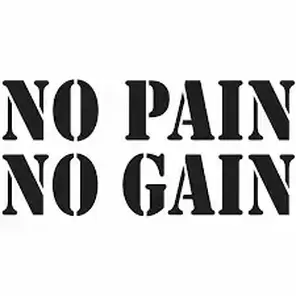Do You Need To Push Yourself To The Limit?
 No Pain, No Gain?
No Pain, No Gain?
A common issue I have often to deal is clients believing workouts need to be extra tough to make progress. So many people think believe that they have to be pushed to the max in order to burn as much fat as possible. They judge how effective a workout is by how hard it was, how exhausted they were and how sore they were after. None of these are a good way to judge a workout. Anyone can design a workout to tire you out and make you sore, but that doesn’t mean you’ll make progress and get better.
It’s not their fault they think like this. Most people in the fitness industry that sell selling something don’t have your best interest in mind, and aren’t always honest. Celebrities, athletes, personal trainers and people on social media often exaggerate how hard and long their training routines are. All this gives the general public the wrong idea. Most people are just starting training don’t know what's needed to achieve their goals.
Training hard is important, and you'll have to be past your comfort zone, but you need to be able to train consistently and make progress over the long term. Many people start an exercise routine that is too ambitious and won't be able to do it for long. I’ve talked before about the importance of consistency. One workout, or one week of training really doesn’t make any difference by itself no matter how hard you train.
At 36 years old I have low body fat all year, but while I train hard, I don’t train anywhere near as hard as many of my clients first believed when they started training with me that they needed to train to have low body fat.
I’m not lazy, if doing more and pushing myself harder would achieve better results, I would do it. I train the way I do as it works, I can recover and do the next workout and I can do it consistently for a long time.
This Has Been my Routine or the Past 6 Months.
Don’t judge how effective your workouts are how hard it was, how exhausted you were or how sore you were after. Start a training program you can stick to for a long time and focus on making small improvements every workout. These small improvements will add up over time.
It’s not their fault they think like this. Most people in the fitness industry that sell selling something don’t have your best interest in mind, and aren’t always honest. Celebrities, athletes, personal trainers and people on social media often exaggerate how hard and long their training routines are. All this gives the general public the wrong idea. Most people are just starting training don’t know what's needed to achieve their goals.
Training hard is important, and you'll have to be past your comfort zone, but you need to be able to train consistently and make progress over the long term. Many people start an exercise routine that is too ambitious and won't be able to do it for long. I’ve talked before about the importance of consistency. One workout, or one week of training really doesn’t make any difference by itself no matter how hard you train.
At 36 years old I have low body fat all year, but while I train hard, I don’t train anywhere near as hard as many of my clients first believed when they started training with me that they needed to train to have low body fat.
I’m not lazy, if doing more and pushing myself harder would achieve better results, I would do it. I train the way I do as it works, I can recover and do the next workout and I can do it consistently for a long time.
This Has Been my Routine or the Past 6 Months.
- Weight lifting 4 days a week (sometimes 3 days a week).
- The workouts are done in 45-60 minutes. Each exercise has warm up sets with only one hard set each.
- Cardio. 20 minutes 2-3 times a week. Very easy work. My heart rate never goes very high. 10000-15000 steps a day
- Nutrition. The main thing to focus on if you want low body fat. I’m very consistent with this. I’ll eat and drink what I want when I’m socialising, but eat a good diet day to day.
Don’t judge how effective your workouts are how hard it was, how exhausted you were or how sore you were after. Start a training program you can stick to for a long time and focus on making small improvements every workout. These small improvements will add up over time.